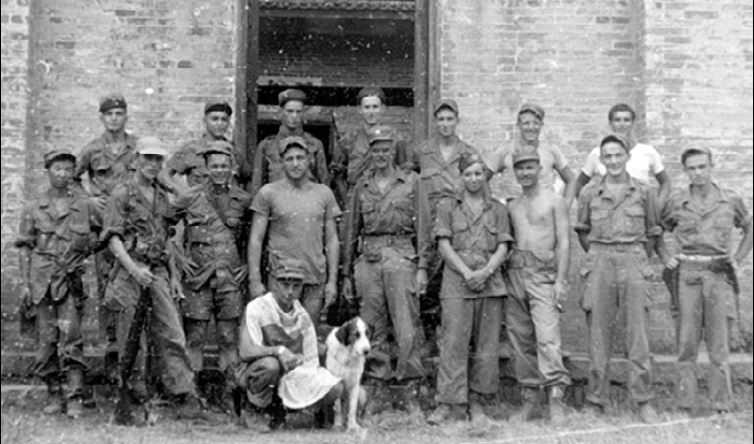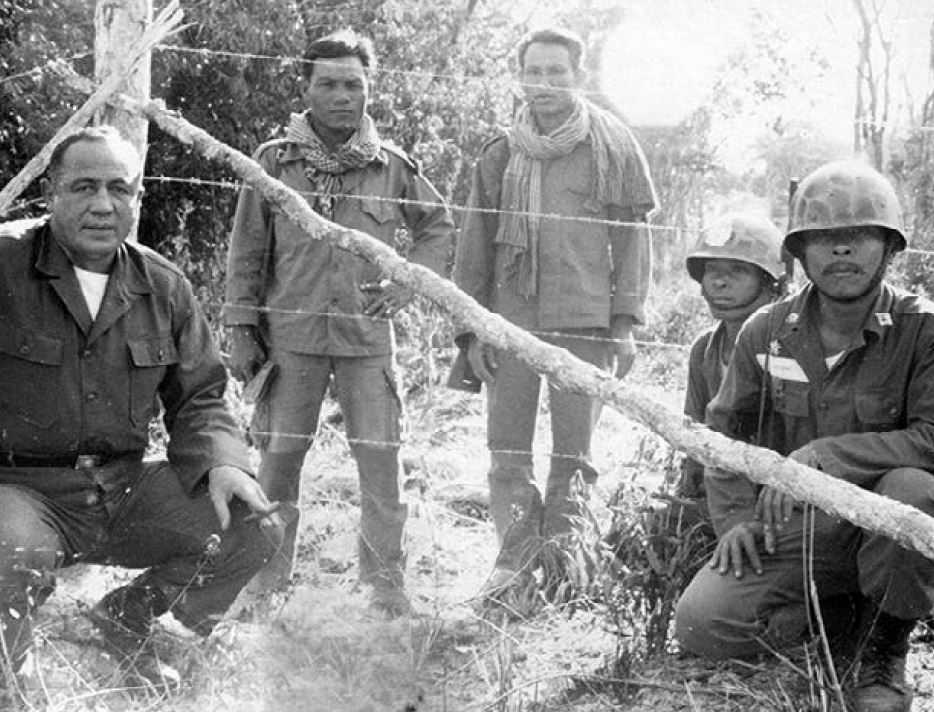Louis Austin O’Jibway was a kind, gentle man who was unflappable in the face of danger. He served as a paratrooper during WWII in America’s first spy agency, the Office of Strategic Services (OSS), and as a paramilitary specialist in the CIA.
O’Jibway, a Chippewa from rural Michigan, was one of the few Native Americans to serve in the OSS and CIA: He’s one of the original 31 officers to have a star on our Memorial Wall.

OSS Operational Group in China: American officers and NCO’s who trained and helped lead the 10th Chinese Commando unit into action against the Japanese. O’Jibway is standing just behind the kneeling officer and the unit’s K9 mascot, Trex. This photograph was taken in Kunming, China, in July 1945. Photograph courtesy of Troy J. Sacquety.
O’Jibway was born in Soo Township, Sault Ste. Marie, on Michigan’s Upper Peninsula. According to John Whiteclay Chambers II, in his article “A Native American Hero in the OSS and CIA” from our June 2020 edition of Students in Intelligence, O’Jibway’s ancestors included chiefs among the Chippewa, also called Ojibwa.
“O’Jibway’s grandfather, a landowning chief, married a French-Canadian woman, a fellow Roman Catholic, in 1880,” according to Chambers. “Thirty years later, one of their children, Joseph E. O’Jibway, owner of a hay and dairy farm and skilled dredge operator, married a Scots-Irish baker, Helen (“Nellie”) Brander. Louis Austin, born November 3, 1918, was the fifth of the couple’s seven children. Although his mother and grandmother were white, O’Jibway identified throughout his life with his Native American heritage.”
A star athlete in high school and college, O’Jibway was a Golden Glove heavyweight boxing campion and considered one of the top college football players in the nation. When he graduated college, he joined the Army and soon became a Lieutenant.
While in the Army, O’Jibway heard about a call for volunteers to serve on “small combat teams” under “hazardous duty”… with little to no other information. O’Jibway, of course, answered that call. He soon discovered he was to become a member of a new, mysterious governmental organization: the Office of Strategic Services led by William “Wild Bill” Donovan.
O’Jibway served with an OSS amphibious unit along the Burma Coast and then as a paratrooper with an OSS operational group against Japanese forces in China. For the latter, he was awarded the bronze star.
After WWII, OSS was disbanded and O’Jibway returned to the boxing ring and embarked on a career as a pro football player. However, he was badly injured during football training camp, ending his sports career track, so he took a job as a security guard and joined the National Guard.
In 1951, the CIA was looking to hire experienced special ops officers and asked O’Jibway if he’d considering returning to the world of intelligence. He accepted and began a career as a clandestine paramilitary officer for the CIA. He quickly rose through the ranks, and was highly respected as a cautious, thoughtful senior officer who always remained calm in dangerous situations. In his free time while stationed overseas, he often helped the local communities, especially the homeless and leper camps, by providing food and resources. He was a man of deep religious faith and believed in helping those less fortunate. Those who knew him talk most of his kindness and empathy.

In Southeast Asia, 1962–65: O’Jibway on the left, apparently with members of Thai Border Patrol Police (kneeling on the right) and with Lao guerrilla fighters. Photograph in the Louis A. O’Jibway Papers, courtesy of Teresa O’Jibway Cook.
Louis O’Jibway was killed in a helicopter crash in Laos in 1965. His body was never recovered. He was among the first 31 stars carved into our Memorial Wall when it was created in 1974 and his name was one of the first inscribed into the Book of Honor.
To learn more about the life and service of this great American hero, check out our June 2020 edition of Studies in Intelligence, Volume 64, No. 2: “Remembering Louis Austin O’Jibway” by John Whiteclay Chambers II.
